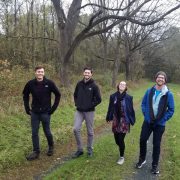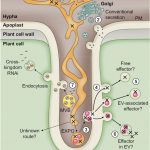President’s Letter—Securing the Future of Plant Biologists
Guest post by Rob Last, ASPB President
ASPB News • January/February 2019 • Volume 46, Number 1
Note: To help increase the usefulness of the President’s Letter and expand participation in ASPB, a collection of resources from other community members that are relevant to this topic are available on the Plantae website. Links are provided to blogs written by members of our community and existing ASPB and external resources. I urge you to spend some time with these resources.
These are times of promise and peril. There are great scientific opportunities for those of us interested in understanding how plants work and using that knowledge to improve the human condition. However, external forces of politics, organizational change in the public and private sectors, and uncertain economic times create risks for scientists, educators, and policymakers. These perils are palpable for plant biologists at all stages of career and life, but we should acknowledge the greater impact of risk to our early career colleagues and those from groups underrepresented in science. This column explores ideas of how we can help each other navigate toward a more secure future and increase the long-term stability of institutions we hold dear.
Create Opportunities for Others
These trends put the onus on those of us who are more secure to create opportunities for others. For example, make trainees aware of resources for increasing their financial security. Several conversations may be required because people often are not comfortable talking about money, but you can ease into it by bringing up noncontroversial topics such as the evils of credit card debt and benefits of compound earnings and by emphasizing personal lessons you have learned. Food insecurity and mental and physical health problems are surprisingly high among students: if you are familiar with local resources, share this information with peers and trainees.
Hiring undergraduate students for the summer or academic year and creating paid summer Research Experience for Undergraduate (REU) programs are great ways to help trainees become more financially secure (https://plantae.org/careers/internships). These also provide authentic research experiences, which increase persistence in science and technology career tracks. Most established scientists can point to one or more such experiences early in their career: I have synthetic organic chemists at Hoffman LaRoche (Dr. Milan Uskokovic; 1977) and a DOE-funded REU program at Argonne National Labs (1978) to thank. We should take the opportunity to give back by paying forward.
Maintain a Personal Development Plan
Progressing through your career, be deliberate in ways that will increase your professional security and resilience. Create and revisit your personal development plan on a regular basis: this is a great way to create goals and catalyze career-focused communication between mentors and trainees (for example, the myIDP tool). Compare notes with members of your social and professional networks, and share the intellectual wealth. If your institution is not creating opportunities for trainees and mentors to learn about diverse career paths, work with your peers to develop programs that bring in successful professionals from different walks of life and stages of career. If such programs already exist, participate and bring your mentors so that they can give broader career advice to future mentees.
Hone Your Communication Skills
Learning to communicate with people of varied professional and cultural backgrounds—including nonscientists—will benefit you every day of your life. Although writing terse and compelling prose is difficult and requires practice, you can learn how excellent writers communicate. If you do not have time for novels or long-form journalism, regularly read the opinion page of your favorite newspaper. Great opinion writing has similar structure and style as strong expository science writing. If you seek experience giving oral presentations, work with your peers and mentors to create a journal club, research forum, or symposium. Participate in events that aim to explain science to the public, whether at a local brewery or in an informal science teaching program at a museum or school.
Branch Out into New Territory
Straying from your comfort zone throughout your life and career is one of the best—and sometimes most difficult—strategies to create a career and personal security. Make sure that you receive broad and deep conceptual and practical training. It is tempting to pursue a narrow set of techniques and subdisciplines, but having broad knowledge and interests can underpin a scientific career in which you live long and prosper.
Changing course is both terrifying and liberating: I promise that you will learn and grow a remarkable amount in the first six months of a completely new job in a new organization. Although I am glad to have spent most of my life in academia, four years in industry and 18 months at NSF transformed the way I think about problems and the research that our group does. Working in another country is enjoyable and has documented a positive influence on career trajectories (Gewin, 2018). Seek out mentors and friends with broad networks and experiences, and encourage those who do not to get out more, meet people, and not shy away from difficult conversations and complex topics. If you are interested in learning more about the value of career changes, I highly recommend a podcast called “The Upside of Quitting” (Dubner, 2011).
Take Advantage of Opportunities for Members
Conviron Scholars Program provides training in communication and career development to dozens of trainees across the globe. Plantae Fellows create content and moderate events for the expanding Plantae online resource.
Ambassadors Program provides students, postdocs, and industry employees opportunities to engage campus communities and the public in outreach activities and contribute articles to the ASPB News. This program and the ongoing expansion of the number of standing committees that include early career professional members provide mechanisms for securing the future relevance of ASPB.
Our three journals embrace ASPB’s role in training the next generation of communicators and leaders while increasing the value and visibility of our publications to readers. Assistant features editors at The Plant Cell and Plant Physiology associate features editors are getting experience in writing, podcasting, and creating video content. Coming soon: international expansion of our reach with short Mandarin and Spanish plain-language The Plant Cell article summaries on WeChat and Twitter, all written by assistant features editors.
Plant Direct is complementing these activities with an associate reviewer board, which will train early career professionals in reviewing and then have them provide manuscript reviews. In return, reviewers get valuable feedback from editorial board members. Together, our journals are going beyond publishing outstanding science to help train the next generation of reviewers, authors, and journalists.
We each have a role in securing one another’s future, and by being an active member of ASPB, you can propel your career and help those who came before you and will follow. Please share your thoughts by email ([email protected]) or on Twitter (@biokid001, #ASPBforward).
References Dubner, S. J. (2011, September 30). The upside of quitting [Podcast]. Freakonomics Radio.
Gewin, V. (2018, November 26). Why you should move country. Nature.
Science Careers Staff. (2013, May 14). myIDP. Science.







Leave a Reply
Want to join the discussion?Feel free to contribute!